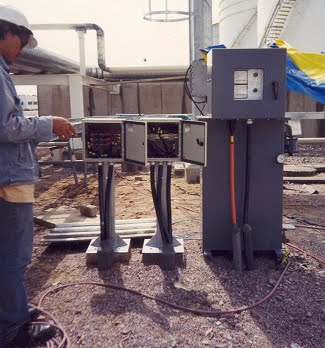http://www.scmp.com/article/1074545/petronesia-benimel-corrtrol-excel-delivering-top-notch-pipeline-solutions
ARTICLE FROM SOUTH CHINA MORNING POST



To paraphrase a proverb, “To err is human; to refrain from saying ‘I told you so’ is divine!” Probably you have had an experience in your work where a department or someone in your company didn’t follow your advice, and whatever you said would happen happened. As satisfying as it may be, such an experience highlights the consequences of ignoring corrosion.
I found this article in one of the corrosion network that I’ve joined for quite sometime which read as follow:
Here’s one from early in my consulting engineering career. About 1950, our later-to-be client, a water utility, laid a new transmission main that included a river crossing. The main was prestressed concrete cylinder, except for the river crossing, which was coated steel. They installed a small impressed current cathodic protection (CP) system on one bank of the river, turned it on, and promptly forgot about it Some 15 years later, the river crossing was leaking so badly it had to be replaced.
The utility retained us to evaluate the situation. We found the rectifier inoperative, no past maintenance or output data, and no CP on the pipe. When the pipe was removed, we found the coating was full of holidays, most of which contained corrosion penetrations. The cause was fairly evident—lack of properly maintained CP. The pipe had been laid in a trench in the river bottom, and samples from the trench walls and bottom showed that the soil was highly corrosive.
The utility’s engineering department wanted to replace the crossing with steel pipe and asked our advice. In our report, we explained the cause of the failure and recommended coating and CP for the replacement pipe. We even recommended a coating material, and gave them a preliminary layout and cost estimate for the CP.
Their engineers mulled this over for a while and then said that they didn’t want any CP. It didn’t work the first time, why should it be expected to work now? Our explanation of why the first CP system failed (lack of maintenance, remember) fell on deaf ears. They were certain that a good coating job was all they needed. We advised them that coating alone wouldn’t work, and without CP, they could expect another failure in 15 to 20 years.
Sure enough, in the early 1980s, the line was again leaking badly and another replacement was needed. Squelching the desire to say, “I told you so,” but smugly smiling to ourselves, we took on the job of designing the new CP. It was installed and we energized it. Data showed the river crossing to be well protected. Our report gave them detailed maintenance instructions and stressed the importance of monthly rectifier inspections and an annual survey to check the effectiveness of the CP.
Our company had long made it a practice to remind our CP clients when their annual inspection was due and provide them with a proposal for the work. The utility did have us come back after the first year, and we found things running well, but that only a couple of rectifier inspections had been made. We again cautioned the client that unless monthly or at least bimonthly inspections were made, one would not know how long the CP had been inoperative once a malfunction was discovered.
For several years we continued making proposals for the annual CP survey, but each time they said no, they didn’t want to spend the money. After a few years, we decided to wait and see what happened.
I don’t know what ever happened to the second replacement, but the incident shows what can occur when corrosion engineering advice is not followed. It was a costly experience for the utility.
There was an advertisement that said, “It’s not nice to fool Mother Nature!” I say, “It’s not nice to ignore corrosion engineering advice!”


The structure to be protected is purposely made a Cathode of an electrochemical cell with respect to an Anode, a less costly & expendable material, which gets consumed & can be replenished as required.